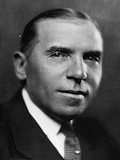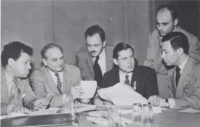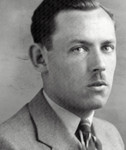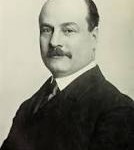Sol Bloom (1870-1949), a congressman from New York, strongly supported the Roosevelt administration’s policies on refugees and Palestine and undermined some Jewish groups’ initiatives to promote rescue action.
The son of Polish Jewish immigrants, Bloom found early professional success as a vaudeville entertainer and producer. He was first elected to the U.S. House of Representatives in 1922, from the 19th District, in Manhattan. Bloom, a Democrat, served fourteen consecutive terms in Congress.
Like many members of Congress, Bloom periodically received requests from individual constituents to assist with the immigration of their relatives, and he made efforts to do so. However, that did not alter his support for President Roosevelt’s restrictionist policies concerning Jewish refugee immigration in general. Although Bloom chaired the House Foreign Affairs Committee for eight years, beginning in 1939, he never challenged the administration’s stance on refugees.
Bloom served as a member of the U.S. delegation to the Bermuda refugee conference in April 1943. The prominent American Jewish leader Rabbi Stephen S. Wise, although himself a strong supporter of the Roosevelt administration, was alarmed by the selection of Bloom, which he saw as a ploy to deflect Jewish criticism of the conference. Wise had previously derided Bloom as “the State Department’s Jew.” Assistant Secretary of State Breckinridge Long in effect confirmed Wise’s fears, when he wrote in his diary that he (Long) chose Bloom for the Bermuda delegation because the congressman was known to be “easy to handle” and “terribly ambitious for publicity.”
Bloom maintained cordial relations with Rabbi Wise, but privately disparaged him; in 1943, he told Vice President Wallace “that Rabbi Wise was a racketeer and that the Zionists were troublemakers.”
Although the Bermuda gathering ended without proposing any substantive plans for rescue, Bloom announced that “as a Jew,” he was “perfectly satisfied” with the results. In his autobiography, published after the war, Bloom continue to defend the outcome of the Bermuda conference, arguing that any announcement of aid to the Jews have led “to intensified persecutions.” American Zionist lobbyist Leon Feuer later recalled from his meetings with Bloom that the congressman “even expressed skepticism about the extent of the Holocaust.” Congressman Emanuel Celler (D-New York) characterized Bloom as “a sycophant of the State Department.”
In October 1943, Bloom tried to dissuade a group of Orthodox rabbis– mobilized by the Bergson Group and the Va’ad ha-Hatzala–from marching in Washington. He told the organizers of the protest that it would be “undignified” for such “un-American looking people” to rally in the nation’s capital.
When the Bergson Group the following month initiated a resolution urging creation of a government agency to rescue refugees, Bloom, at the behest of the administration, insisted on holding full hearings on the resolution. Ordinarily, hearings would be held only on legislation, not on a resolution, which merely expressed the sense of Congress. Bloom wanted to use the hearings to rally opposition to the measure. He insisted on calling Bergson to the podium, even though he had not been scheduled to testify, and questioned him roughly about his status as a foreigner and the forceful wording used in a Bergson Group telegram concerning the hearings.
At the conclusion of the hearings, Bloom mobilized enough votes in the committee to shelve the resolution without a vote. Hoping to demonstrate that those who shelved it were not indifferent to the suffering of the Jews, Bloom published the closed-doors testimony of Assistant Secretary of State Breckinridge Long, thinking that Long’s arguments would undermine the case for the resolution. That strategy backfired when
Long was discovered to have wildly exaggerated U.S. efforts to aid refugees. Mainstream Jewish organizations joined the Bergson Group in challenging Long and U.S. refugee policy. The controversy helped bring about the Senate Foreign Relations Committee’s unanimous adoption of the resolution, which in turn played a role in persuading President Roosevelt to establish the rescue agency that the resolution had requested.
Bloom also tried to persuade the Federal Bureau of Investigation to deport Bergson, a citizen of Palestine, on the grounds that “he would eventually provoke sufficient antagonism among citizens of the United States to cause anti-Semitic pogroms.”
Although generally supportive of the Zionist cause, Bloom sometimes backed down in deference to objections from the White House or State Department. He supported the proposed 1943 Anglo-American statement (the Hoskins Plan) to ban public discussion of Palestine for the duration of the war. Bloom also publicly endorsed the Taft-Wagner and Wright-Compton resolutions of early 1944, which called for opening Palestine to Jewish refugees and creating a Jewish commonwealth there. Behind the scenes, however, Bloom collaborated with the War Department to have the resolutions shelved.
Sources: Wyman, The Abandonment of the Jews, pp.194-197, 201-203;
Stevens, American Zionism and U.S. Foreign Policy, pp.41-53;
Feingold, The Politics of Rescue, p. 195;
Medoff, Militant Zionism in America, p.187.











